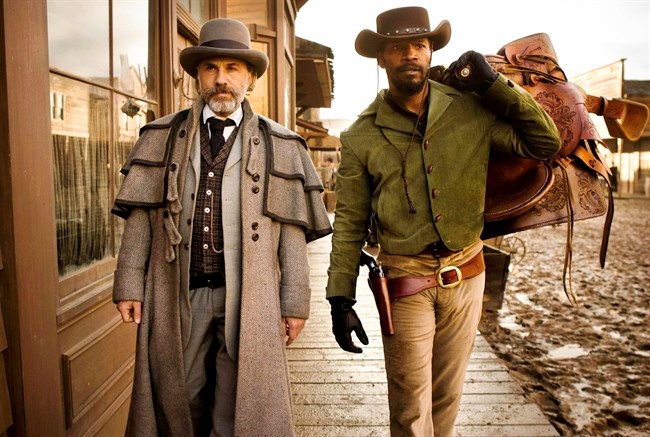TORONTO - Don't mistake "Django Unchained" for a slavery movie, says Quentin Tarantino.
It's simply a Western that depicts slavery, he insists, distinguishing his latest revenge fantasy from a slew of slave-themed predecessors such as the venerable TV miniseries "Roots" and the divisive 1975 feature "Mandingo."
"I wasn't necessarily trying to throw my hat in the slavery movie bandwagon, it was more about making a proper Western," Tarantino says during a recent stop in Toronto to promote the film.
"It was more about the idea of doing a proper Western film that didn't ignore slavery."
As to be expected, the "Pulp Fiction" director's take on the genre is brash and violent, spiked with outlandish satire and lurid brutality.
His stylish spaghetti Western is set in the South two years before the Civil War, with Jamie Foxx starring as the brutalized slave Django.
Django's dim fortunes change when he meets dentist-turned-bounty hunter Dr. King Schultz, a German-born liberal who promises freedom in exchange for help in tracking down a lucrative bounty.
When Django proves to be a talented marksman, Schultz, played by "Inglourious Basterds"'s Christoph Waltz, strikes a new deal — one that makes them partners in the bounty business and gives Django an ally in his own quest to rescue his enslaved wife Broomhilda, played by Kerry Washington.
From there, their exploits take them from plantation to plantation with Django growing increasingly skilled at dispatching merciless justice on an array of slack-jawed slaveowners.
Needless to say, the body count mounts and Tarantino lets loose with his love-it-or-hate-it flair for over-the-top carnage and off-kilter laughs.
"What I've always liked about spaghetti Westerns is they take the Western genre that had been around for so long in America but they blew it up to operatic proportions with their cool mix of surrealism and violence and gallows humour," says Tarantino, who draws his hero's name from the 1966 spaghetti Western "Django," starring Franco Nero, who also makes a cameo here.
"I thought all those things would be wonderful (in) a tale of an ex-slave who becomes a bounty hunter, basically on a romantic quest to save his woman."
"Django Unchained" was written right after "Inglourious Basterds," itself a revenge fantasy set in the Second World War, in which Jewish soldiers and an orphaned Jewish theatre owner plot to kill Hitler.
If the stories appear to be two sides of the same coin, it's for good reason, Tarantino allows.
"There can't help but be a symbiotic connection to them because 1) they're both period pieces in ways that I've never done before and 2) in most video stores I used to go into, the war section was usually right next to the Western section. So there is a kind of symbiotic relationship, even in the subgenres."
But while it's clearly a fictional tale, Tarantino says "Django" is "rooted in a tremendous amount of reality."
"A case could be made that 'Inglourious Basterds' is an alternative history but only towards the very end. This isn't an alternative history — this is the history of America."
Tarantino pulls no punches in depicting black slaves beset by beatings, whippings and brandings, insisting such graphic displays drive home the horrors of past real-life atrocities.
The worst of it takes place at a sprawling plantation known as "Candyland," where a sadistic third-generation slave-owner named Calvin Candie, played by Leonardo DiCaprio, forces slaves to battle each other to death for sport.
At the same time, Candie's most trusted confidant is his black house slave Stephen, played by Samuel L. Jackson, and Tarantino says he relished the chance to examine the complex hierarchies and dysfunctions that existed between — and within — the races.
"Those haven't been explored, you know, there's a tremendous amount of dramatic meat on that bone that really can be chewed on and savoured," says Tarantino, who reinvented the crime drama with "Reservoir Dogs," tackled '70s blaxpoitation with "Jackie Brown" and reimagined kung fu films with the "Kill Bill" series.
"(Stephen) doesn't feel that he's a slave at all, he feels he's actually the freest person on the plantation and for that matter, he is.... He runs Candyland and for all intents and purposes he's Calvin's father. And for all intents and purposes Calvin is his son. Except for Django, he is truly the freest black man in the movie."
While "Django Unchained" joins a growing list of Tarantino tributes to a beloved film genre, the writer-director says it does depart substantially from the way he's tackled scripts before.
"In the case of 'Kill Bill,' that's basically from the Bride's perspective from the beginning to the end, but then I have all those different chapters — each chapter represents a different genre of action cinema, so thus it's checkerboarded," he notes.
"But in this, I've never written a character that is so one way on page 1 and so completely different on page 170.... And so I didn't want to do some of my normal storytelling techniques of breaking it down into chapters, introducing other characters and letting them come in from the left or the right and have everything converge.
"I wanted it to be Django's story all the way from beginning to end."
"Django Unchained" hits theatres Christmas Day.



